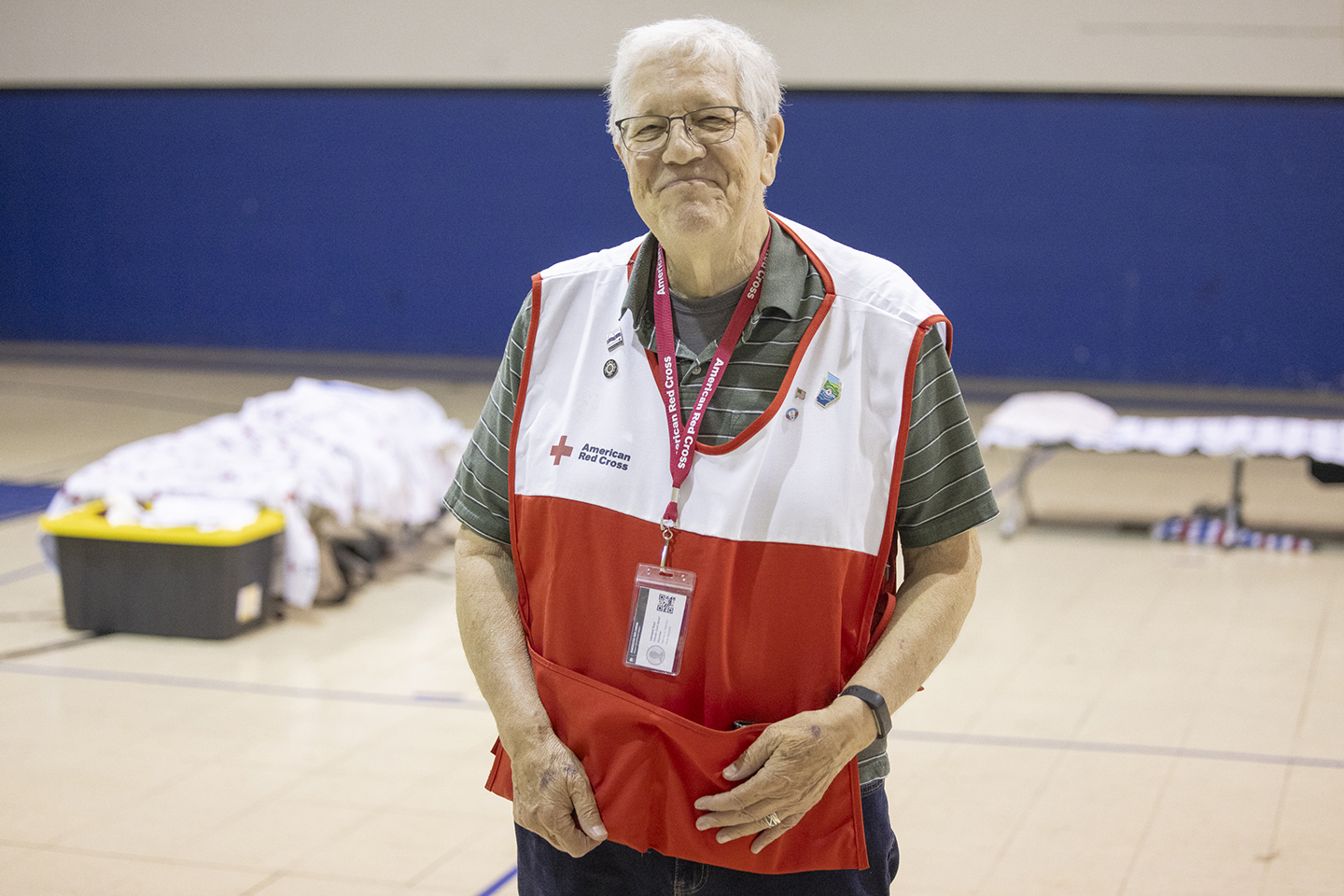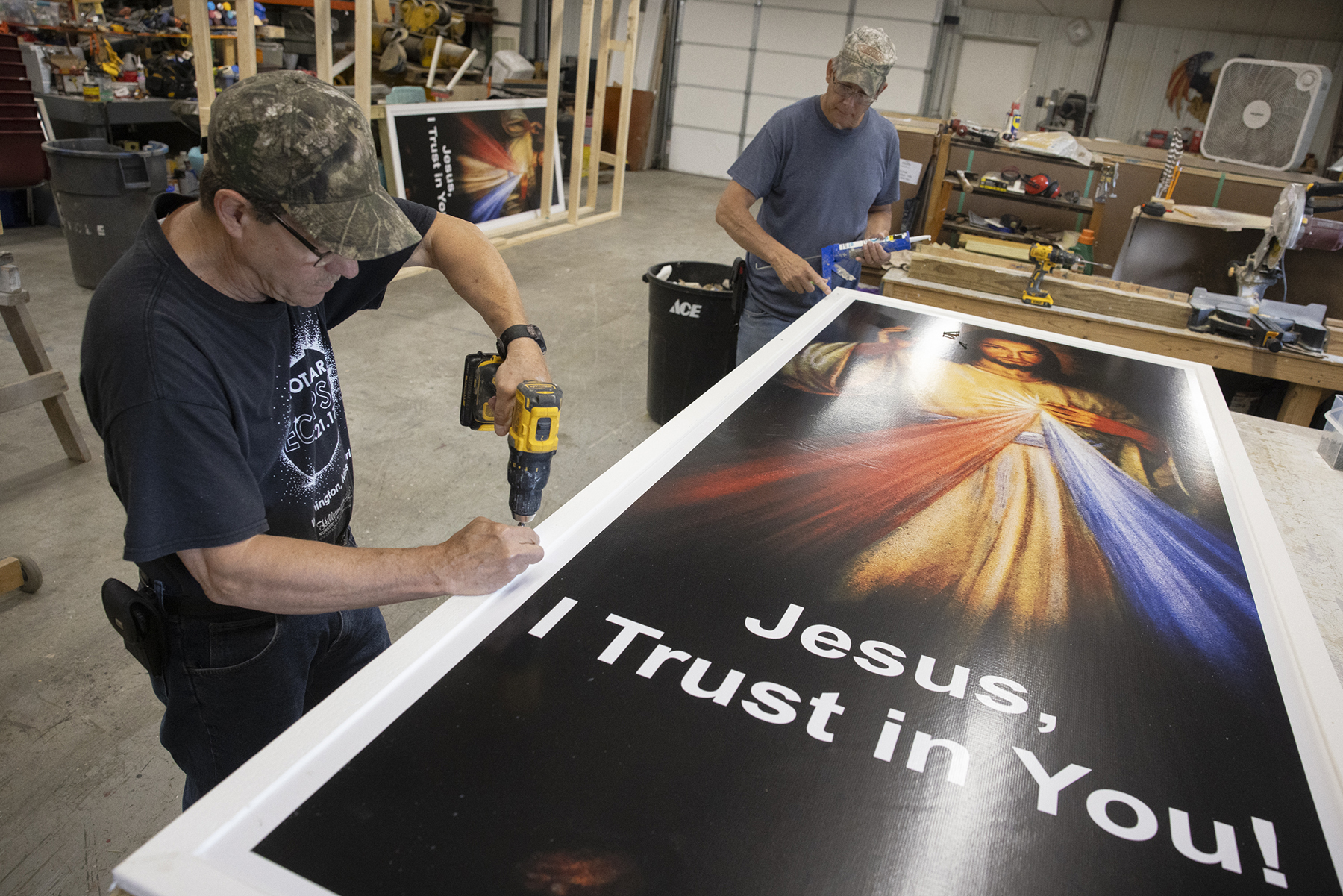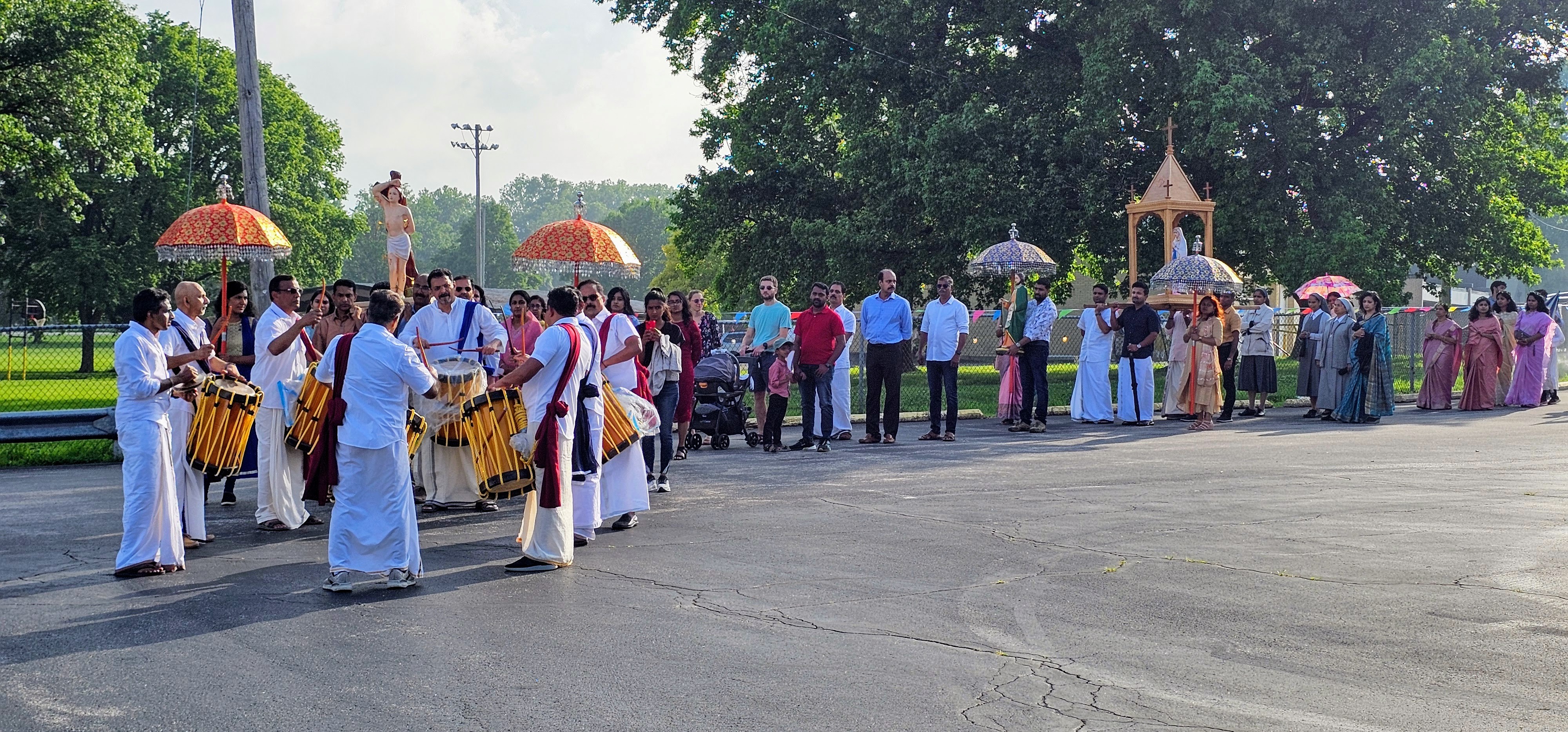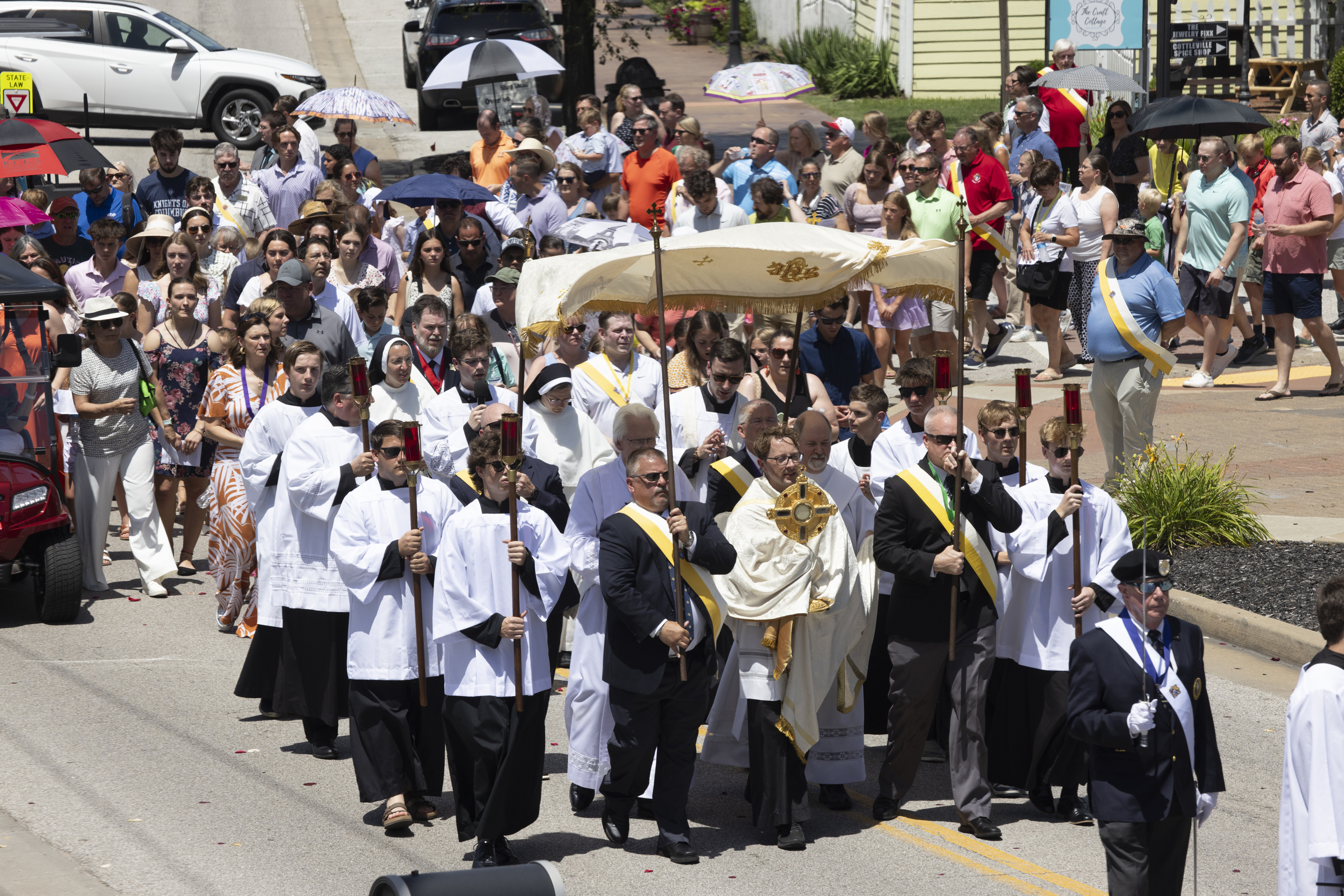Archdiocese of St. Louis synodal synthesis
Synodal Synthesis for the Archdiocese of St. Louis
Encountering the People of God: Approach, Methodology, and Demographics
Approach
The Archdiocese of St. Louis engaged Catholic Leadership Institute (CLI) to facilitate an Archdiocesan-wide feedback process using their Disciple Maker Index (DMI) Survey. The Archdiocese also reached out to 10 target groups via custom surveys and in-person forums.
The Archbishop offered the following to parishioners of the Archdiocese to set the tone of the synodal listening sessions and connect the “All Things New” Archdiocesan initiative:
In St Louis, we are blessed that the Synod aligns with our “All Things New” initiative. Both begin with prayer and listening. What we are learning from the local faithful will inspire our efforts to build a renewed Church, a renewed mission, and a vibrant future in our own Archdiocese.
As we embark on these historic journeys together, let us invite the Holy Spirit to be our guide, to inspire our commitment to listen and engage, especially with those who feel unheard or overlooked, with those who share our faith, and with those who have not yet heard or been moved by the Word of God. This is an exciting time to be Catholic!
Methodology
A subcommittee was established to facilitate the listening process:
Subcommittee Names
- Deacon Chris Ast (Director, Office of the Diaconate; Executive Director, Department of Evangelization and Parish Ministry Support)
- Fr. Mitch Doyen (Pastor, St. John the Baptist Parish)
- Joyce Jones (Director, Office of Racial Harmony)
- Marie Kenyon (Director, Office of Peace & Justice)
- Javier Orozco (Executive Director, Human Dignity and Intercultural Affairs)
- Olivia Walter (Intern, Office of Peace & Justice)
- Nancy Werner (Chancellor)
Facilitated Listening Sessions and Surveys
The Archdiocese identified 11 groups crucial to the synodal dialogue reflecting our local commitment to reach out to communities at the margins:
Women in the Church
- Method: Written and online survey conducted at the Catholic Women for Christ Conference
- Participants: 468 participants
Men
- Method: Online three-question survey
- Participants: 167 responses
Cultural Families
- Method: Listening sessions conducted at Aquinas Institute of Theology
- Participants: 25 participants from various racial and ethnic groups , the largest groups represented were from the African-American and Hispanic Community
Catholic Student Center at Washington University
- Method: Listening sessions
- Participants: 116 responses (16-28 years of age)
Parents with Children who Identify as Transgender
- Method: In-person panel
- Participants: 9 participants shared their stories (one person submitting a letter)
People who identify as LGBTQA+
- Method: Listening session conducted at St. Cronan’s Parish
- Participants: Over 100 participants including 7 pastors
Those Impacted by Poverty
- Method: St. Vincent de Paul survey conducted during home visits
- Participants: 34 individual responses
Those Incarcerated and Their Families
- Method: Written surveys administered by chaplains and criminal justice volunteers
- Participants: 8 incarcerated persons, 11 incarcerated and those ministering to them, and a third group of clergy and volunteers
Those Leaving or Have Left the Church
- Method: Listening session conducted at Aquinas Institute of Theology
- Participants: 25 participants (all over 30 years of age)
Ecumenical/Interfaith
- Method: Online survey
- Participants: 11 participants
Catholic Health Care Providers
- Method: Listening Sessions conducted at 4 Mercy Hospital locations
- Participants: 100 participants
Disciple Maker Index (DMI) Survey:
An additional method of giving voice
All parishes were invited to participate in the DMI. The survey was made available in 20 languages, online, on paper, and in braille. It was provided through the Archdiocese and promoted within the parishes. The survey’s purpose was to get a sense of where participants are in their faith journey and how they believe parishes are accompanying them. Demographics are self-identified and are helpful in seeing the scope of diversity and how well distinct groups within communities are being served.
Demographics
As expected, and is customary, the DMI Survey gathered data from a significantly greater number of participants. 70,768 parishioners participated in the DMI survey, while 564 people participated in the listening sessions/target group surveys.
Of the 70,768 respondents, 60,000 voluntarily provided demographic information, the percentages are as follows:
Age:
Under 18: 2%
18-25: 2%
26-35: 6%
36-45: 14%
46-55: 14%
56-65: 22%
66-75: 23%
Over 75: 17%
Sex:
Male: 37%
Female: 63%
Marital Status:
Single: 12%
Married: 74%
Divorced: 5%
Widowed: 9%
Ethnicity/Race:
Black or African American: 1%
Asian American: 1%
Caucasian: 94%
Hispanic/Latino: 3%
Native American: 1%
Themes across Target Groups and DMI Respondents
The preparatory document for the diocesan synodal process called for consultation with the People of God regarding “journeying together” in the local church, guided by the Holy Spirit. The following over-arching themes rose. Within each theme are summaries, quotes, and recommendations from the Listening Sessions with Disciple Maker Index Survey insights.
Love for the Church Universal
Summary:
An expression of hope and love was consistently voiced for the Church Universal. Participants mentioned the living presence of Christ, the universality of the Mass, the Eucharist and the other Sacraments, Sacred Scripture, and clergy who relate and collaborate well with the laity, who recognize the gifts of the laity and who adopt pastoral and compassionate approaches.
Community, Christian fellowship, a sense of belonging, and a common identity were often noted as manifesting a profound sense of healing, comfort, peace, and support.
Works of charity by the Church bring joy as an active expression of Christ’s love for others. There was a strong appreciation for the St. Vincent de Paul ministry as well as for those who had a particular ministry to those on the margins (e.g., incarcerated persons, LGBTQ, teens, etc.).
Many respondents articulated appreciation for Pope Francis as well as the opportunity to participate in the synodal process.
Some powerful quotes from the Listening Sessions:
A quote reflecting the Church through St. Vincent de Paul: “In my experience the Catholic faith is brought together by great people, with pure hearts, doing good work through Christ, for all people and especially those that need reminders that God is working for us, even when we think He isn’t there, he builds a family around us, when least expected.”
Some people understood the Holy Spirit working within their lives, especially in times of great turmoil and personal struggle. “When I was incarcerated, I was scared, did not know what to expect, I heard the Spirit say, ‘you will be alright my son’, after hearing the voice a sense of calmness came over me.”
From those who are leaving or left: “Don’t be afraid of messiness…Pope Francis models the courage to enter into and be okay with the messiness.”
From cultural families: “At its best, [the Church] is a place that welcomes diverse and different voices.”
Disciple Maker Index Survey (DMI) Insights
Where participants find joy:
- 90% agree or strongly agree that Jesus died and rose again for my salvation.
- 85% agree or strongly agree that the Eucharist is the Body and Blood of Christ.
- 87% agree or strongly agree that Scripture is the Word of God.
- 78% agree or strongly agree that they would recommend their pastor to a friend.
- 86% agree or strongly agree that they would recommend their parish to a friend.
- 84% attend Mass at least weekly.
- 83% take time for individual prayer at least weekly.
- 81% agree or strongly agree that their parish provides opportunities for them to serve those in need.
- 75% agree or strongly agree with the teaching authority of the Church.
- 76% believe that the Church is critical to their relationship with God.
- 81% agree or strongly agree with Jesus’ moral teachings for their lives as taught by the Church.
- 73% agree or strongly agree that the Church provides a community to support them and/or their families in times of need.
Feedback indicating opportunities for action:
- Only 34% participate in some other Catholic devotions on a weekly or more frequent basis.
- Only 10% participate in reconciliation on a monthly or more frequent basis.
- Only 15% invited someone to Mass monthly or more frequently.
The Church’s Ability to Listen
Summary:
Concern for the Church’s ability to listen without judgement was voiced across the listening sessions. Some participants voiced frustration that a “safe place” to have dialogue did not seem to be available or was there a willingness to create these spaces. While some exceptions were noted, the general perception was that there are not open places to gain understanding both on issues affecting those on the margins and what the stance of the Church was with pathways to engagement.
Some participants spoke about a lack of communication at various levels of the Church, which has created confusion.
Some respondents perceive that Church authorities disagree with each other and offer contradictory messages. Understandably, laity can sometimes feel lost in the middle.
A possible demographic division in the clergy was noted. A perceived challenge in seminary formation and then carryover to priesthood was sited.
Respondents across listening sessions saw the Priest’s Scandal as an impediment to moving forward. There is a perception that the rules do not pertain to clergy, do as we say and not what we do.
Clericalism was also seen as a real challenge to applying Christ’s message of love and supporting a transparent, outwardly focused way.
This synodal process was noted as a hopeful sign and should be a model in the parishes going forward.
Some powerful quotes from the Listening Sessions:
“One thing that comes to mind is even just how we welcome those who are disheveled coming to Mass. Do we welcome them or judge them?”
“I have a son with a disability and it’s hard for him to go to Mass. I would like [him to be welcomed] so we can worship as a family.”
“A space where they can go, or meet in person, and ask the uncomfortable questions with feeling judged or scolded.”
“Around 40% if trans and gender-nonconforming people attempt suicide.” “This is a pro-life issue.”
“The Archdiocese of St. Louis has been very proactive in outreach to establish and nurture interfaith relations.” Not perceived as consistently important across parishes.
“Parents feel like they have to choose between the Church and their LGBTQIA children.”
“If any of my children were gay or lesbian or transgendered, I would feel like I have to leave the Catholic faith in order for them to find a spiritual home.”
“We help the poor but are not open to them.”
“I am in need of internalizing this quote just as much as anyone in the Church, but Gustavo Gutierrez once said, “So you love the poor…name them!” I think the first step to better listening to marginalized groups is to know people’s stories, their fears, their struggles, as well as their hopes, their faith, and their desires.”
“A church for the poor doesn’t mean the church rejects her heritage. Rich beautiful liturgies with incense, bells, and chant are not antithetical to the above stated ways of being Jesus in the world. Rather, a rich and enculturated liturgy facilitates and fosters these very ministries. People dislike traditional liturgies when the liturgy seems to not bear fruit toward ministering to the community. If the homilies and parishioners are racist, homophobic, or xenophobic, with what liturgy they worship means nothing. Until we learn that our liturgy can be reverent, beautiful, within living tradition, and our ministries prioritizing the poor and marginalized, we will not have a thriving Catholicism.”
“I think Church does a great job listening to the marginalized – do the marginalized listen attentively to the Church?”
“Follow Pope Francis’ example, including the Eucharist as medicine rather than a prize for the perfect.”
“I am part of a Catholic family but have not been to church lately due to my work schedule.”
“The Church can listen to those incarcerated by first not tending to them as individuals who need charity.”
“The fact that these questions are being asked is hopeful, would not have been asked 20 years ago…lots of healing is needed…”
Speaking about Cultural Families: “We compete rather than working together.”
“My catholic childhood is muddy. I don’t remember what I learned. We were talked at rather than talked with.”
About the Catholic Student Center at Washington University: “Huge joy is that I’m in a community now where it’s allowed to ask questions.”
“There is always a BUT. You should love your neighbor BUT. Everyone is welcome BUT.”
Disciple Maker Index Survey (DMI) Insights
Understanding that those who respond “Strongly Agree” are passionate around DMI questions, there is opportunity for growth in communication:
- 39% strongly agree that their parish provides opportunities to serve those in need.
- 30% strongly agree that their parish follows up with them when they express interest in becoming more involved.
- 38% strongly agree that their parish provides a community to support them and/or their families in times of need.
- 50% strongly agree that their parish makes information easy for me to find. This is a positive and may be in response to the pandemic and the need for outreach.
- 34% strongly agree that their parish exhibits care to members of the community (not necessarily Catholic).
Living the Catholic Faith, Missionary Discipleship, and Catholic Social Teaching
Summary:
Across the 11 Target Listening Sessions, an urgency was placed on living out the Catholic Faith through equipping in the areas of Missionary Discipleship and Catholic Social Teaching. The groups saw a divide between what we say and what we do. There was a call for clarity and consistency on church teachings around challenging topics and clear training on strategies for engagement. Divisions exist on many fronts: Priest/Laity Ecclesiology, Conservatism vs Liberalism, Traditionalists vs Progressives, and prejudices. This combined with faith formation falling off significantly after Confirmation creates a true challenge in drawing new Catholics and welcoming back those that have left the faith or sense of belonging in the Church.
Some powerful quotes from the Listening Sessions:
“Why would we, when someone is hurting, read them doctrine?”
“My heart is broken by clericalism, abuses (especially sexual abuse) and arrogance among leaders. Those who are more focused on the rules and the rubrics than the heart of the Gospel. Chrisitians who are not filled with joy and hope but instead preach exclusion and condemnation”.
“We have people outside the Church think that we ‘hate’ people who don’t live up to the Church’s teachings.”
“The doors should always be open to discuss but I also believe in beliefs, rules, and processes. If you don’t agree with the beliefs of a group, then you need to find a group that fits you better.”
“As a young adult, it breaks my heart that a number of my friends were not raised in the Catholic Church in such a way that showed them the beauty of the Mass and encountered Jesus through the Eucharist…they do not see the point of confession if they can just talk to God and they see Catholicism as a rule book. It is a shame Catholic are notorious (myself included) for being some of the least familiar with scripture and least welcoming to the marginalized.”
“Educate the parishioners to respond to these groups in a loving, non-threatening manner.”
“Teach parishioners what to say to people in those situations that they tell us they don’t come anymore because they don’t feel welcomed because they are gay or because they are divorced and feel ostracized because of church rules. I’m a lifelong Catholic and I don’t know what to say to these things.”
“Invest in equipping those who do not know how to share it with others.”
“I think sometimes as “good Catholics” who attend Mass regularly, etc., we tend to focus on maintaining our comfort zone more than reaching out to the work in need of Jesus.”
“I didn’t get the idea of God being a father and me being a son until after I left that Sunday School.”
“A great joy for me has been to meet people who are ahead of me in the spiritual life who I’ve been able to befriend and take as role models.”
About the Catholic Student Center: “If it wasn’t because of a community like this I don’t know that I would practice. This place gives me hope that there is a possibility for change.”
Disciple Maker Index Survey (DMI) Insights
The percentage of “Strongly Agrees” shows both hope and opportunity in faith formation and equipping missionary disciples:
- 42% strongly agree that their parish helps them grow spiritually as a Catholic.
- 27% strongly agree that their parish helps them develop a personal prayer life that connects them with God.
- 20% strongly agree that their parish connects them with a small/faith-sharing group.
- 39% strongly agree that their parish provides preaching, homilies that connect their faith with everyday life.
- 26% strongly agree that their parish provides retreats, workshops, and other resources to help them figure out their life’s purpose. The pandemic may be an influencer on this availability.
- 18% strongly agree that their parish teaches them to read and pray with the Bible.
- 36% strongly agree that their parish helps them prepare for sacraments (Confirmation, Marriage, Baptism).
- 28% strongly agree that their parish forms them as a disciple of Jesus Christ.
- 23% strongly agree that their parish provides high-quality events and other opportunities to which they can invite people. Once again, the pandemic is an influencer here.
- 19% strongly agree that their parish grows their confidence in the Church’s teachings so they can answer other’s questions.
- 20% strongly agree that their parish teaches them how to share the story of Jesus.
- 16% strongly agree that their parish helps them share their person witness story.
- 30% strongly agree that their parish helps them recognize God is working in their lives.
- 48% strongly agree that they have adequate support from their parish to help their child(ren) grow as disciples of Jesus Christ.
- 65% strongly agree that they would recommend their parish Catholic School to a friend.
- 61% strongly agree that they would recommend their parish’s religious education to a friend.
- 15% invited some to join them for Mass monthly or more often.
- 23% answered another person’s question about a teaching of the Catholic Church monthly or more often.
- 32% volunteered to serve a member of the community (not necessarily Catholic) monthly or more often.
- 24% shared the story of Jesus with another person monthly or more often.
- 18% shared their personal witness story with another person monthly or more often.
- 50% prayed with another person outside of Mass monthly or more often.
- 24% shared the story of Jesus with another person.
Reaching out to the “Strongly Agrees” and “Monthly or More Often” respondents as a core group would be an opportunity to grow the overall community.
The Role of Women
Summary:
Expanding the roles of women and empowering women in the Church was often requested. Both Deacons, Priests and other roles of leadership were cited. The perceived reduced number of Priests and their male perspective was mentioned as an opportunity to increase participation and leadership of women.
Some powerful quotes from the Listening Sessions:
“The older I get I find it more difficult to connect to priests and church leaders who have not walked in my shoes as a woman, who have not been married, born children, experienced sexism, felt the body shame that I carry with me to this day. It’s time to include women in top leadership so that the Church can better reflect the Body of Christ.”
“The structure is contradicting – how is it that most of the decisions are made by men? I don’t see women in the ‘say’ of the church in the hierarchy of the church. I hear people calling us hypocrites – and it’s hard to say that they are wrong.”
“One of my biggest obstacles is that as a woman we are constantly regulated for how we behave how we dress and you want to see the church as a home but I’ve always been told not to dress in a certain way because I’ll be tempting men to sin but [then hear] how we respect women so much but do you? There are so few opportunities for having a role. It’s hard to penetrate.”
“When the person you’re supposed to go to are older men, but the priest asks questions and you’re like ‘why did you just ask that?’ Priests don’t understand what we’re going through and you have to go a roundabout way when men can just go to a priest.”
Disciple Maker Index Survey (DMI) Insights
63% of DMI respondents identified themselves as women. This translates to 37,629 respondents.
Next Steps
Parishes of the Archdiocese of St. Louis are encouraged to use their Disciple Maker Index (DMI) Survey Data as the starting point for pastoral planning. CLI is conducting webinars for pastors and volunteers on how to access and navigate the many reports coming from this important feedback, how to identify priorities based on the data, how to create goals, and how to communicate results to parishioners.
This will equip parishes to work with their leadership teams (e.g., pastoral council, finance council) to address the expressed desires and concerns that both the survey results and the listening sessions have yielded. The consultative model provided by this synodal process will greatly support this planning effort. These pastoral plans will be important and tangible outcomes of the synodal process at the local level.
The local archdiocesan committee charged with conducting the listening sessions with the marginalized in the region will continue its work, facilitating ongoing dialogue with our various groups of disciples, while we await further direction from the U.S. bishops and the Holy Father.







